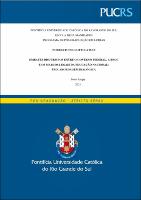| Share record |


|
Please use this identifier to cite or link to this item:
https://tede2.pucrs.br/tede2/handle/tede/9721| Document type: | Dissertação |
| Title: | Embates discursivos entre o Governo Federal, a BNCC e os marcos legais da educação nacional : uma abordagem dialógica |
| Author: | Catuci, Norberto Niclotti |
| Advisor: | Fanti, Maria da Glória Corrêa di |
| Abstract (native): | Diante do atual cenário sociopolítico brasileiro, permeado por discursos intolerantes e, tendo como pressupostos a teoria dialógica do discurso (BAKHTIN, 2010a, 2010b, 2016; VOLÓCHINOV, 2018, 2019; MEDVIÉDEV, 2012), o presente trabalho tem como objetivo geral investigar o embate discursivo entre valores do atual Governo Federal e dos marcos legais da educação nacional, observando a relação de tensão axiológica evidenciada por declarações durante uma reunião ministerial ocorrida em abril de 2020. Como objetivo específico, visa analisar como os valores preconizados pelos diferentes documentos que embasam a elaboração da Base Nacional Comum Curricular (BNCC) reverberam nos enunciados dos ministros na reunião ministerial, verificando de que modo práticas sócio-históricas intolerantes são refletidas e refratadas no/pelo discurso governista atual. No que tange aos procedimentos metodológicos, seguimos as orientações propostas por Volóchinov (2018), que consideram a interdependência entre esfera de atividade, gênero do discurso e enunciado, e delimitamos para análise enunciados da equipe ministerial, considerando os seguintes critérios: a) evidente responsividade discursiva e relação temática com os documentos relativos à educação nacional e b) relevância do sujeito enunciador, considerando-se o cargo que ocupa no Governo Federal e o impacto de suas declarações e decisões na sociedade. Assim sendo, selecionamos dizeres realizados durante a referida reunião ministerial dos seguintes ministros do governo do Presidente Jair Messias Bolsonaro: Ricardo Salles (Meio Ambiente), Damares Alves (Mulher, Família e Direitos Humanos), Abraham Weintraub (Educação) e Paulo Guedes (Economia), e os organizamos conforme afinidade entre suas temáticas centrais e as macroáreas propostas por material oficial de apoio para a implementação da BNCC: Meio Ambiente, Multiculturalismo e Economia. A partir das análises, constatamos que o ideário do discurso do governo bolsonarista encontra-se atravessado ideologicamente por valores avessos aos dos documentos que devem orientar a educação no país, podendo resultar em um conflito contraprodutivo, o qual não anda na esteira das propostas legais, pedagógicas e metodológicas propostas na BNCC. |
| Abstract (english): | Within the current socio-political scenario of Brazil, imbued with intolerant speech, and based upon the Dialogical Theory of Discourse (BAKHTIN, 2010a, 2010b, 2016; VOLÓCHINOV, 2018, 2019; MEDVIÉDEV, 2012), this thesis aims to investigate the discursive confrontation between the values held by the current Federal Government and the legal framework of national education in order to observe the axiological tensions evidenced by utterances produced during a presidential cabinet meeting in April 2020. The specific objective of this thesis is to analyze how the values advocated by the different documents in which the Common National Curricular Base (BNCC, in Portuguese) is legally funded reverberated in the utterances of the ministers at the cabinet meeting, and to identify how socio-historical practices - such as intolerance and patrimonialism - are reflected and refracted on/by the discourse of the current Federal Government of Brazil. We follow the methodological guidelines proposed by Volóchinov (2018), which acknowledge the interdependence between fields of activity, speech genres and concrete utterances. We considered the following criteria to select the utterances by the cabinet members for the analysis: a) evident discursive addressivity and thematic relation with documents related to national education and b) relevance of the uttering subject, considering the position they hold in the Federal Government and the impact of their declarations and decisions on society. Consequently, we selected utterances from the aforementioned cabinet meeting produced by the following ministers of President Jair Messias Bolsonaro's cabinet: Ricardo Salles (Environment), Damares Alves (Women, Family and Human Rights), Abraham Weintraub (Education) and Paulo Guedes (Economy), and organized them given the affinity between their central thematics and the Macroareas proposed by official supporting material for the implementation of the BNCC document: Environment, Multiculturalism and Economy, accordingly. From the analyses, we verified that the ideal of Bolsonaro government's discourse is ideologically imbued with values that are contrary to those of the documents that are guidelines for Education policies in Brazil. We conclude that these axiological confrontations may result in a counterproductive conflict that does not follow the legal, pedagogical, and methodological proposals in the BNCC. |
| Keywords: | Teoria Dialógica do Discurso Base Nacional Comum Curricular (BNCC) Reunião Ministerial Governo Bolsonaro Valores Dialogical Discourse Theory Common Curricular National Base (BNCC) Presidential Cabinet Meeting Bolsonaro Government Values |
| CNPQ Knowledge Areas: | LINGUISTICA, LETRAS E ARTES::LETRAS |
| Language: | por |
| Country: | Brasil |
| Publisher: | Pontifícia Universidade Católica do Rio Grande do Sul |
| Institution Acronym: | PUCRS |
| Department: | Escola de Humanidades |
| Program: | Programa de Pós-Graduação em Letras |
| Access type: | Acesso Aberto |
| Fulltext access restriction: | Trabalho não apresenta restrição para publicação |
| URI: | http://tede2.pucrs.br/tede2/handle/tede/9721 |
| Issue Date: | 29-Mar-2021 |
| Appears in Collections: | Programa de Pós-Graduação em Letras |
Files in This Item:
| File | Description | Size | Format | |
|---|---|---|---|---|
| Dissertação - Norberto Niclotti Catuci.pdf | NORBERTO_NICLOTTI_CATUCI_DIS | 1.82 MB | Adobe PDF |  Download/Open Preview |
Items in DSpace are protected by copyright, with all rights reserved, unless otherwise indicated.




